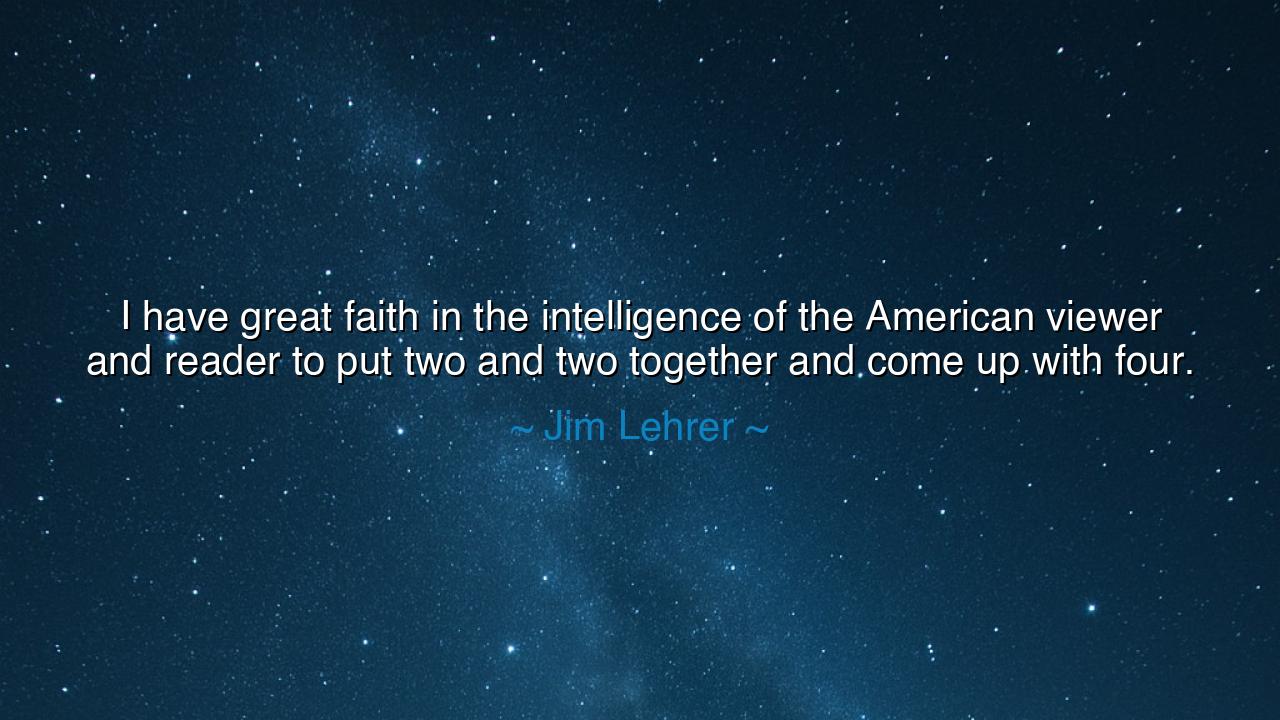
I have great faith in the intelligence of the American viewer and
I have great faith in the intelligence of the American viewer and reader to put two and two together and come up with four.






When Jim Lehrer, the distinguished journalist and longtime host of PBS’s NewsHour, declared, “I have great faith in the intelligence of the American viewer and reader to put two and two together and come up with four,” he was speaking not only as a man of the press, but as a guardian of truth and reason. His words resound like the voice of an elder philosopher addressing a gathering of citizens, reminding them that democracy itself is sustained by trust in the discernment of the people. Lehrer's statement, though humble in tone, carries the quiet fire of belief in the collective wisdom of ordinary minds—the conviction that, when given honest facts, people will find their way to truth without the need for manipulation or deceit.
The origin of this quote lies in Lehrer’s lifelong devotion to journalistic integrity. In an era increasingly dominated by spectacle, partisanship, and sensationalism, he stood as a man of restraint and balance. He believed that the purpose of journalism was not to tell the audience what to think, but to give them the tools to think for themselves. His faith in the “intelligence of the viewer” was not naïve—it was a call to dignity, a recognition of the sacred bond between truth-teller and truth-seeker. Lehrer trusted that the people, if spoken to with honesty and respect, would respond not with ignorance, but with understanding.
To “put two and two together and come up with four” is to see through the noise of rhetoric and illusion—to reason clearly, to perceive truth amid confusion. In this phrase, Lehrer invokes one of humanity’s oldest virtues: the capacity for critical thought. Since the days of the philosopher Socrates, wisdom has been born not from blind obedience, but from questioning, examining, and discerning. Socrates himself was condemned for teaching people to think for themselves, yet his legacy endures precisely because he awakened in others the courage to reason. So too did Lehrer, in his quiet way, stand for the power of thought over propaganda, reason over reaction, and faith over fear.
Consider, for a moment, a story from another time. When Abraham Lincoln debated Stephen Douglas in 1858, he faced a divided nation and an uncertain future. Yet he chose not to shout, nor to insult, but to reason. He spoke to the conscience and intellect of his listeners, trusting that they, too, could “put two and two together”—that they could see through the fog of prejudice and recognize the moral truth of equality. His faith in the public’s intelligence was the same faith Lehrer spoke of a century later. It is this faith that builds nations; without it, democracy withers into tyranny, and truth becomes the possession of the powerful.
But Lehrer’s words also carry a warning. To believe in the intelligence of the viewer is to demand responsibility from the viewer. Faith without effort becomes blindness. The gift of freedom requires the discipline of thought. It is not enough to consume information; one must interpret it, weigh it, and seek understanding. The wise do not let their opinions be dictated by the loudest voice, but by the quiet reasoning of their own conscience. In this way, Lehrer’s quote becomes both a tribute and a challenge—to journalists to respect their audience, and to the audience to rise to the level of respect that truth deserves.
The ancients would have recognized Lehrer's wisdom as akin to that of the Athenian agora, where citizens gathered not to be entertained, but to be enlightened. There, as in the republics of later ages, the health of the nation depended on the strength of its collective intellect. When Lehrer spoke of the intelligence of the American reader and viewer, he echoed this same timeless belief—that a people educated in truth and guided by reflection can govern themselves more justly than any king or tyrant ever could.
So let this teaching be remembered: truth is a partnership. The journalist must speak with honesty; the listener must think with clarity. The speaker who manipulates and the audience that refuses to reason are equally complicit in the decay of truth. But when both honor their duties—the duty to inform, and the duty to understand—the result is harmony, wisdom, and justice. Lehrer’s faith in the intelligence of the people was not blind optimism—it was a torch passed down through generations, from philosopher to statesman, from teacher to citizen.
Thus, dear reader, take this wisdom to heart: think deeply, listen carefully, and seek truth earnestly. Do not surrender your mind to noise, nor your conscience to convenience. Put two and two together. Find the truth that lies between the lines. For it is only when the people think—truly think—that freedom endures, and the light of understanding continues to shine upon the world.






AAdministratorAdministrator
Welcome, honored guests. Please leave a comment, we will respond soon